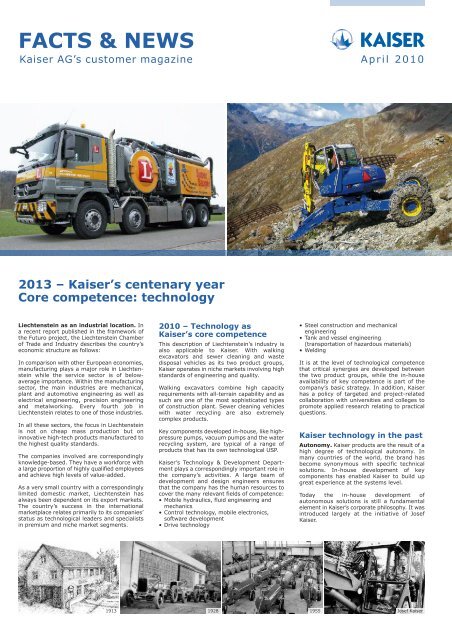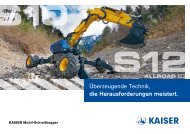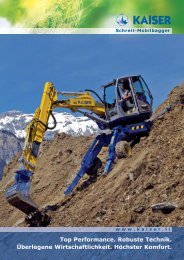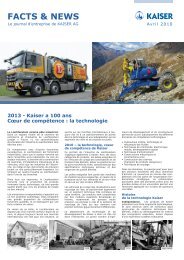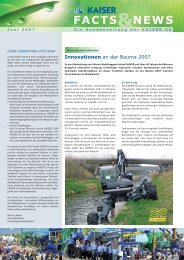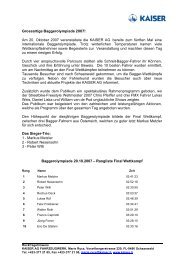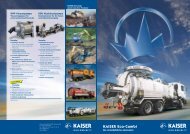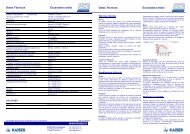Kaiser's - Kaiser AG
Kaiser's - Kaiser AG
Kaiser's - Kaiser AG
Create successful ePaper yourself
Turn your PDF publications into a flip-book with our unique Google optimized e-Paper software.
FACTS & NEWS<br />
<strong>Kaiser</strong> <strong>AG</strong>’s customer magazine A p r i l 2 0 1 0<br />
2013 – <strong>Kaiser</strong>’s centenary year<br />
Core competence: technology<br />
Liechtenstein as an industrial location. In<br />
a recent report published in the framework of<br />
the Futuro project, the Liechtenstein Chamber<br />
of Trade and Industry describes the country’s<br />
economic structure as follows:<br />
In comparison with other European economies,<br />
manufacturing plays a major role in Liechtenstein<br />
while the service sector is of belowaverage<br />
importance. Within the manufacturing<br />
sector, the main industries are mechanical,<br />
plant and automotive engineering as well as<br />
electrical engineering, precision engineering<br />
and metalworking. Every fourth job in<br />
Liechtenstein relates to one of those industries.<br />
In all these sectors, the focus in Liechtenstein<br />
is not on cheap mass production but on<br />
innovative high-tech products manufactured to<br />
the highest quality standards.<br />
The companies involved are correspondingly<br />
knowledge-based. They have a workforce with<br />
a large proportion of highly qualified employees<br />
and achieve high levels of value-added.<br />
As a very small country with a correspondingly<br />
limited domestic market, Liechtenstein has<br />
always been dependent on its export markets.<br />
The country’s success in the international<br />
marketplace relates primarily to its companies’<br />
status as technological leaders and specialists<br />
in premium and niche market segments.<br />
2010 – Technology as<br />
<strong>Kaiser</strong>’s core competence<br />
This description of Liechtenstein’s industry is<br />
also applicable to <strong>Kaiser</strong>. With walking<br />
excavators and sewer cleaning and waste<br />
disposal vehicles as its two product groups,<br />
<strong>Kaiser</strong> operates in niche markets involving high<br />
standards of engineering and quality.<br />
Walking excavators combine high capacity<br />
requirements with all-terrain capability and as<br />
such are one of the most sophisticated types<br />
of construction plant. Sewer cleaning vehicles<br />
with water recycling are also extremely<br />
complex products.<br />
Key components developed in-house, like highpressure<br />
pumps, vacuum pumps and the water<br />
recycling system, are typical of a range of<br />
products that has its own technological USP.<br />
<strong>Kaiser</strong>’s Technology & Development Department<br />
plays a correspondingly important role in<br />
the company’s activities. A large team of<br />
development and design engineers ensures<br />
that the company has the human resources to<br />
cover the many relevant fields of competence:<br />
• Mobile hydraulics, fluid engineering and<br />
mechanics<br />
• Control technology, mobile electronics,<br />
software development<br />
• Drive technology<br />
• Steel construction and mechanical<br />
engineering<br />
• Tank and vessel engineering<br />
(transportation of hazardous materials)<br />
• Welding<br />
It is at the level of technological competence<br />
that critical synergies are developed between<br />
the two product groups, while the in-house<br />
availability of key competence is part of the<br />
company’s basic strategy. In addition, <strong>Kaiser</strong><br />
has a policy of targeted and project-related<br />
collaboration with universities and colleges to<br />
promote applied research relating to practical<br />
questions.<br />
<strong>Kaiser</strong> technology in the past<br />
Autonomy. <strong>Kaiser</strong> products are the result of a<br />
high degree of technological autonomy. In<br />
many countries of the world, the brand has<br />
become synonymous with specific technical<br />
solutions. In-house development of key<br />
components has enabled <strong>Kaiser</strong> to build up<br />
great experience at the systems level.<br />
Today the in-house development of<br />
autonomous solutions is still a fundamental<br />
element in <strong>Kaiser</strong>’s corporate philosophy. It was<br />
introduced largely at the initiative of Josef<br />
<strong>Kaiser</strong>.<br />
1913 1928 1955 Josef <strong>Kaiser</strong>
2<br />
2013 – <strong>Kaiser</strong>’s centenary year, core competence: technology<br />
As an inventor and entrepreneur, he was<br />
attracted by the challenge of new technical<br />
developments when he took over the company<br />
from his father in 1953. He also saw the<br />
potential for successful trading in niche<br />
markets with just a small number of players.<br />
Internationalization. In view of the very<br />
limited size of Liechtenstein’s domestic market,<br />
<strong>Kaiser</strong> was quick to recognize the need for an<br />
international posture, although the various<br />
markets all have their specificities with regard<br />
to the style of working, the technologies used,<br />
and relations between buyers and sellers.<br />
On the other hand, the challenges presented<br />
by the markets in terms of varying environmental<br />
standards and market structures have<br />
continually stimulated the development of new<br />
and enhanced products.<br />
For an international service network, accurate<br />
technical documents are of great importance.<br />
Detailed drawings of a high standard are a<br />
prerequisite for efficient spare parts inventory<br />
management. That in turn is a precondition for<br />
building up and retaining an international<br />
customer base.<br />
Close customer relations. A business that<br />
involves limited sales of products for niche<br />
markets offers ideal conditions for close<br />
customer relations. In the case of the sewer<br />
cleaning vehicles, especially, where customized<br />
products are the order of the day, the company<br />
is basically operating in a project development<br />
market, and customer requirements and ideas<br />
Product development triggered by exhaust emission regulations in the construction plant industry<br />
Exhaust gas after-treatment phase 2012-2014<br />
The origins of exhaust emissions legislation<br />
Experience gained in the field of automotive<br />
engineering has been transferred to industrial<br />
applications (non-road) with the aim of<br />
reducing nitrogen oxide emissions (NOx) and<br />
controlling pollutant emissions such as carbon<br />
monoxide (CO), hydrocarbons (HC) and<br />
particulate matter.<br />
The respective limit values are defined in the<br />
Tier 1-4 emission standards. For Europe, the<br />
EPA Environment Protection Agency has<br />
defined these limit values in Stages I, II, IIIA<br />
and IIIB, and IV.<br />
play a much greater role in design engineering<br />
and product development that in the case of<br />
series production. At the same time, the<br />
necessary degree of flexibility calls for a high<br />
standard of technical competence.<br />
Trends in technology<br />
The value of technology. For both product<br />
groups, <strong>Kaiser</strong>’s customers themselves have a<br />
high level of technological competence. We<br />
must therefore offer professional advisory<br />
services and an extensive service network with<br />
fast spare parts delivery in keeping with the<br />
needs of the capital goods market.<br />
In today’s markets, we are seeing a growing<br />
number of imitations of <strong>Kaiser</strong> products from<br />
both divisions. Of course, they do not<br />
necessarily offer the same standard in terms of<br />
quality, efficiency, innovation, experience and<br />
safety – convincing arguments as key factors<br />
in a technology-driven industry.<br />
Legislation. Over the last few decades there<br />
has been a continual increase in the number<br />
and scope of the mandatory provisions to be<br />
met, many of which significantly influence the<br />
design of our products, e.g. with regard to<br />
exhaust emissions, environmental impacts and<br />
the technical documents.<br />
Considerable resources have to be committed<br />
to the engineering and process adjustments<br />
required to comply with such regulations, which<br />
are binding on all companies regardless of their<br />
size. Although that can be a problem for very<br />
Exhaust gas after-treatment systems<br />
Today’s Stage IIIA diesel engines cannot meet<br />
the emission control requirements for Stages<br />
IIIB or IV. In addition to the measures<br />
introduced to date, such as electronic engine<br />
management, high-pressure fuel injection and<br />
particulate filters, exhaust gas after-treatment<br />
involving the injection of urea (AdBlue) is also<br />
required. The relevant development work on<br />
non-road engines has not yet reached the<br />
series production stage.<br />
small businesses, <strong>Kaiser</strong> has the size and<br />
organizational structure to respond quickly<br />
and efficiently to changes in legislation and<br />
industry codes without detriment to its<br />
flexibility and speed of reaction as an SME.<br />
Environmental engineering: a technology<br />
of the future. Environmental engineering is all<br />
about reducing environmental pollution,<br />
developing products and services that are more<br />
sparing of resources and the environment, and<br />
generally deploying strategies for the more<br />
efficient use of resources.<br />
In both product groups, the environmental<br />
footprint is becoming more and more critical<br />
for our customers as they make increasing use<br />
of ecological arguments in their communications<br />
with the industrial and municipal end<br />
users.<br />
Product innovation is increasingly targeted at<br />
sustainability. Environmental engineering has<br />
become a highly dynamic industry with shorter<br />
and shorter innovation cycles. The challenges<br />
are growing accordingly, with innovation<br />
becoming a critical factor in terms of differentiation<br />
from the competition, substitute<br />
products coming onto the market more quickly,<br />
innovation needed in response to individual<br />
customer requirements, and time to market<br />
becoming increasingly decisive, etc.<br />
As in the past, the success of a company will<br />
depend on a culture of innovation and a policy<br />
of involving customers in the innovation<br />
processes to ensure that it is they who benefit.<br />
KAISEr Austria, Nenzing<br />
KAISEr Liechtenstein, Schaanwald KAISEr Slovakia, Krakovany<br />
The challenge for <strong>Kaiser</strong><br />
The diesel engine as the source of motive<br />
power is the central component in our vehicles<br />
and machines. Its characteristics, including<br />
available power, torque and engine speed,<br />
influence all connected consumers.<br />
The challenge for the design engineer is particularly<br />
great in the case of compact machines,<br />
as the exhaust gas after-treatment equipment<br />
increases the space requirement for the diesel<br />
engine by about 30-40%. The complexity of<br />
the product is also greater in terms of engine<br />
management and system stability.
Interview: "Volksblatt", 24 December 2009<br />
In the lead with high tech<br />
<strong>Kaiser</strong> <strong>AG</strong>: Record year with sewer cleaning vehicles<br />
SCHAANWALD – <strong>Kaiser</strong> <strong>AG</strong> is one of the<br />
companies that have grown in spite of the<br />
economic crisis. But this is no time to relax.<br />
“We have significantly upgraded our engineer -<br />
ing and development activities,” says CEO<br />
Markus <strong>Kaiser</strong>.<br />
Kornelia Pfeiffer, “Volksblatt”:<br />
Mr <strong>Kaiser</strong>, what do you think of the<br />
pursuit scenes in Vienna’s sewers in “The<br />
Third Man”?<br />
Markus <strong>Kaiser</strong>:<br />
I guess I saw the film the same way as you.<br />
What I am more interested in is the technology<br />
we use for sewer cleaning today.<br />
Until well into the 1950s, cleaning the sewers –<br />
a city’s "intestines" – was very hard work for<br />
the cleaning crews ...<br />
... and in some places it still is. Take India: The<br />
way they clean the sewers there is inhuman<br />
and there are often fatalities. There are huge<br />
differences from country to country. Modern<br />
sewer cleaning methods are only considered an<br />
option when a country has reached a certain<br />
level of development.<br />
So the market must have great potential?<br />
Basically, yes, but simply taking the Swiss<br />
market and extrapolating on the basis of the<br />
population figures for India does not make<br />
much sense; it will take decades to reach the<br />
kind of sales figures we have in Europe.<br />
How many competitors do you have?<br />
They are many and varied; we have different<br />
competitors in every country. The methods<br />
employed for sewer cleaning vary widely from<br />
one region to another, and so the role of<br />
technology and progress varies, too. But<br />
<strong>Kaiser</strong> is one of the biggest players and one of<br />
the few who have built up an international<br />
presence.<br />
One way of moving into new markets is via the<br />
big sewer cleaning companies, and they are<br />
already in our customer base.<br />
How was business in 2009?<br />
We achieved record sales with our sewer<br />
cleaning vehicles. That made it a very good<br />
year for <strong>Kaiser</strong> in total, with sales up by more<br />
than ten percent. Our traditional markets –<br />
France, Germany, Switzerland and Austria –<br />
continued to develop well. Sales were stable in<br />
Poland, the Czech republic and Slovakia, but<br />
the markets collapsed completely in romania,<br />
Bulgaria and russia. Fortunately, we were able<br />
to compensate the downturn there with good<br />
results in other regions like South Africa and<br />
the Arab countries.<br />
Even though sales of walking excavators were<br />
20 to 25 percent down, total sales were in line<br />
with the previous year’s results. And we<br />
managed without any job losses or short-time<br />
working; we were able to switch employees<br />
who were surplus to requirements for the<br />
walking excavators to our cleaning vehicle<br />
production department. A case of fortune<br />
favoring the brave, if you like, that developments<br />
were so positive and dynamic in the field<br />
in which the company was first established.<br />
Markus <strong>Kaiser</strong>: Slump in russia and the USA compensated by sales in South Africa and the Arab countries<br />
And you are still gaining market shares?<br />
Sewer cleaning with water recycling technology,<br />
that is our speciality. Ninety percent of the<br />
vehicles we sell are equipped that way. And<br />
wherever this high technological standard is<br />
called for, we are the market leaders worldwide<br />
and we were able to increase our market<br />
shares, even in such a difficult business year.<br />
What did the economic crisis do to <strong>Kaiser</strong>?<br />
It was a mixture of good and bad. Even with<br />
our sewer cleaning vehicles, we did not do so<br />
well in south-east Europe and the Asian<br />
countries, but that was compensated by growth<br />
elsewhere. Conversely, we were very stable<br />
and successful with sales of walking excavators<br />
in Switzerland and Austria, whereas sales<br />
collapsed in other regions like russia and, once<br />
again, the USA.<br />
You also assemble vehicles locally in Asia<br />
and Russia. How is your systems selling<br />
business doing?<br />
It’s more or less stable or slightly down on<br />
the previous year. After all, unlike us, the<br />
international sewer industry is not growing at<br />
present, and many of our competitors are<br />
having a hard time.<br />
Have you got the skilled labor you need?<br />
In 2009 we invested heavily in our Engineering<br />
and Development departments, and we were<br />
able to recruit engineers who would probably<br />
have looked for work with the big corporations<br />
before. It looks as if we, as an SME with 200<br />
employees, are now more attractive for<br />
qualified personnel who appreciate our values,<br />
strategy, corporate culture and products.<br />
Clean water is becoming increasingly<br />
scarce. Every drop counts. How are you<br />
reacting at the level of R&D?<br />
Ecological thinking – that is about more than<br />
the fact that the <strong>Kaiser</strong> recycling system<br />
permits sewers to be cleaned without using<br />
clean water. Of course it’s a big thing,<br />
FACTS & NEWS<br />
especially where there is a shortage of water.<br />
We have the only system in the world that still<br />
works where the sewer system has not been<br />
cleaned for years and the level of soiling is<br />
extremely high. Our vehicles make it possible<br />
to save water, and also time and fuel, i.e. raw<br />
materials and money.<br />
In addition to the commercial aspects, ecology<br />
is also important today. In France, for<br />
example, we are now the market leader in the<br />
field of recycling. That was of no interest there<br />
only five or six years ago, and for a long time<br />
people said that the high standard we provided<br />
in Switzerland would never catch on. But they<br />
were wrong. Take Poland, where we first had<br />
customers entering the market with simpler<br />
sewer cleaning vehicles. Ten years later they<br />
are investing in vehicles that are no different<br />
from what we sell in Switzerland. And the same<br />
applies to other countries. But we cannot rest<br />
on our technological laurels; others will try to<br />
jump on the bandwagon.<br />
That is why we have upgraded our r&D department,<br />
with two specific objectives: On the<br />
one hand we want to improve the efficiency of<br />
our water recycling system wherever possible,<br />
and on the other hand we are aiming to leave<br />
the competition behind with regard to the<br />
efficiency of the match between the truck, the<br />
high-pressure pump and the filter system, and<br />
also with regard to user-friendly operation. The<br />
electronics are a critical factor here.<br />
But the high-tech sewer cleaning vehicles<br />
are not sexy like the walking excavators!<br />
I disagree. The walking excavator is a product<br />
that appeals to the boy in every man and<br />
attracts attention with spectacular operations.<br />
That is part of the picture in our region. But if<br />
you go to Poland, you will find that the sewer<br />
cleaning vehicles have a similar image. And I<br />
am often surprised to see how emotional grown<br />
men can be when they come to Schaanwald to<br />
collect a vehicle.<br />
3
4<br />
KAISEr Sewer Cleaning and Disposal<br />
<strong>Kaiser</strong> recycling technology makes its mark in France<br />
Until only a few years ago there was little<br />
interest in sewer cleaning with water recycling<br />
in France. A basic skepticism on the subject<br />
was fueled by the inefficiency of the systems<br />
on the market and a lack of information with<br />
regard to the alternatives. It was not until<br />
2003, when a number of demonstration tours<br />
were organized in collaboration with Baroclean<br />
as <strong>Kaiser</strong>’s new sales and service partner in<br />
France and the first customer reports came in<br />
confirming the advantages of the water<br />
recycling technology, that <strong>Kaiser</strong> was able to<br />
significantly strengthen its market position.<br />
<strong>Kaiser</strong> recycling technology is fundamentally<br />
different from the systems offered by other<br />
companies and has meaningful advantages.<br />
France’s unique market structure<br />
The structure of the sewer cleaning industry in<br />
France differs from other European countries.<br />
The French market is dominated by big corporations<br />
specializing in the waste water and<br />
waste management industries. With their<br />
decades of experience and expertise in the<br />
fields of water and waste water management,<br />
they introduced recycling technologies via their<br />
subsidiaries and those technologies have since<br />
spread to external environment service<br />
providers. A policy of regular demonstrations<br />
with new products and the high level of<br />
customer care provided by Baroclean have<br />
further consolidated <strong>Kaiser</strong>’s market position in<br />
France, and the company is now established as<br />
the benchmark for sewer cleaning with water<br />
recycling.<br />
Product development through close<br />
customer contact<br />
The specific requirements of the Paris sewer<br />
system have led to the development of highcapacity<br />
vehicles. The depth of the sewers calls<br />
for maximum performance in terms of suction<br />
– a requirement that has been met with the<br />
help of tandem <strong>Kaiser</strong> vacuum pumps.<br />
Installation of the <strong>Kaiser</strong> vacuum pump in the<br />
clean water tank also reduces noise emissions,<br />
which is ideal for night-time working to avoid<br />
disruption to urban traffic. In the meantime,<br />
demand for such high-performance suction<br />
vehicles is growing in other cities and countries,<br />
too.<br />
New markets<br />
in the Middle East<br />
The presence of French companies on the<br />
international markets and the positive reports<br />
coming in from France have opened up new<br />
markets for <strong>Kaiser</strong>, and several recycling<br />
vehicles are now deployed in Saudi Arabia and<br />
the Arab Emirates. In the framework of<br />
upgrade and modernization programs for the<br />
Clear decision in favor of<br />
<strong>Kaiser</strong> recycling technology in the UK<br />
<strong>Kaiser</strong>-Whale saw the light of day in 2005 as a<br />
partnership involving two established brands.<br />
In just five years, the company has moved up to<br />
become the market leader in the field of<br />
recycling.<br />
Interview with Mark Warmington,<br />
Managing Director of Whale Tankers Ltd.<br />
Whale decided to integrate the <strong>Kaiser</strong><br />
recycling system into their existing vehicles.<br />
What were the main reasons?<br />
Given that sewer cleaning with water recycling<br />
vehicles were well known and proven within<br />
central Europe, we recognized that an increasing<br />
number of customers were looking to deploy<br />
similar technologies. realizing the demand<br />
potential, we at Whale began looking to develop<br />
a specialist Jet-Vac recycling vehicle to<br />
complement our existing product range.<br />
We knew that <strong>Kaiser</strong> <strong>AG</strong> were the acknowledged<br />
leader in water recycling equipment in<br />
Europe. As a result, a dialog between both<br />
organizations began and the relationship has<br />
gone from strength to strength.<br />
In addition to the technology that <strong>Kaiser</strong> has<br />
developed fitting with our own requirements, so<br />
too did their philosophy on recycling. Other key<br />
synergies also existed such as being similar size<br />
companies. <strong>Kaiser</strong> had the flexibility to supply the<br />
componentry that we could design engineer to<br />
meet the subtly different needs of the UK<br />
marketplace.<br />
Also fundamental to the relationship’s early<br />
success was the openness that existed between<br />
both organizations in terms of the transfer of<br />
technologies.<br />
How did customers react to the new<br />
<strong>Kaiser</strong>-Whale?<br />
With many of our customers, like ourselves,<br />
having heard of <strong>Kaiser</strong>, a large percentage<br />
immediately became excited about the prospects<br />
of being able to implement its technologies here<br />
in the UK. And whilst the uptake of product<br />
continues to support the enthusiasm that an<br />
increasing number of customers have for the<br />
<strong>Kaiser</strong>-Whale, we have invested significant<br />
resources in continually educating customers<br />
about the advantages of the <strong>Kaiser</strong>-Whale. Such<br />
an education process has involved the delivery of<br />
seminars, production of support literature, indepth<br />
discussion forums and an active<br />
demonstration program. Indeed as we speak, the<br />
<strong>Kaiser</strong>-Whale is on tour here in the UK and the<br />
feedback continues to be extremely positive.<br />
In addition to us having the correct infrastructure<br />
to support the product in terms of both vehicle<br />
servicing and parts, <strong>Kaiser</strong> and our customers<br />
also benefit from the fact that we lead the field<br />
when it comes to issues such as compliance and<br />
the requirements of meeting relevant regulatory<br />
issues.<br />
sewer systems in the Arab countries, the focus<br />
is increasingly on an efficient approach to<br />
preventive sewer cleaning operations. Since<br />
water is an expensive and limited resource in<br />
these countries, recycling vehicles offer not<br />
only the right technology but also the most<br />
economical solution.<br />
As a result of poor maintenance over the years,<br />
the degree of soiling in the sewers is a serious<br />
problem, with pronounced levels of silting,<br />
suspended solids and fat deposits. But the<br />
<strong>Kaiser</strong> water recycling system offers reliable<br />
results under even the most demanding<br />
conditions.<br />
Arab Emirates 2009<br />
Key facts about Whale Tankers<br />
Based in Solihull, West Midlands, England, Whale has<br />
grown from 3 people specializing in welding and<br />
fabrication, to over 180 employees with revenue. 2010<br />
will see Whale Tankers celebrate its 40th anniversary.<br />
As a manufacturer of sewer cleaning vehicles,<br />
Whale supplies to water companies, other utilities,<br />
contractors, hire and leasing companies, local<br />
authorities and industrial users.<br />
Whale Tankers is the largest independent waste tanker<br />
inspection body in the UK and has the largest team of<br />
UK on-site field service engineers of its kind.<br />
www.whale.co.uk<br />
Original <strong>Kaiser</strong><br />
The <strong>Kaiser</strong> water recycling system is the<br />
result of years of development work and<br />
a continuous process of fine-tuning for<br />
the various components. In the meantime,<br />
the success of the water recycling<br />
philosophy has tempted other companies<br />
onto the market with me-too products.<br />
Whether imitation systems can offer the<br />
same performance without <strong>Kaiser</strong>’s<br />
complete process know-how and long<br />
years of experience remains to be seen.<br />
At all events, in such a technology-driven<br />
industry the following key requirements<br />
are powerful arguments for the original:<br />
• Quality<br />
• Innovation<br />
• Efficiency<br />
• Experience and reliability
KAISER Hurricane<br />
A top-performance vehicle designed for<br />
vacuum-pumping wet and dry materials.<br />
Powerful suction offers outstanding perform -<br />
ance in terms of both distance and vertical<br />
height. That makes the Hurricane the ideal<br />
solution for vacuum and blowing operations<br />
where access is difficult. A blow injector<br />
incorporated in the tank lid permits the<br />
collected waste to be unloaded from the tank<br />
pneumatically.<br />
The liquid ring vacuum pump has a capacity of<br />
7000 m3/h. Exhaust air filtering is performed<br />
with the help of a low-maintenance dry filter<br />
made of PTFE-coated sintered plastic with fully<br />
automatic de-dusting of the filter elements.<br />
Integration of the vacuum pump in the clean<br />
water tank is the key to a shorter wheel base<br />
and reduced noise emissions as well as shorter<br />
vacuum lines on the vehicle.<br />
KSR42 with hydraulic<br />
hose handling<br />
The KSr42 is a cassette-type boom with<br />
hydraulic control of the suction nozzle. The<br />
telescopic rotating suction hose can be<br />
quickly moved into the working position<br />
with maximum precision.<br />
In combination with the telescopic KSA11,<br />
the suction and flushing hoses can be<br />
rotated together for accurate positioning.<br />
For manhole work, the hose can also be<br />
raised and lowered hydraulically.<br />
• 1m telescopic extension<br />
• 180° hydraulic rotation<br />
• 20° hydraulic lift<br />
Vacuum and blower performance can be<br />
controlled with stepless adjustment<br />
irrespective of vehicle engine speed.<br />
Applications<br />
• Flat roof rehabilitation: vacuum removal<br />
and subsequent return of the chippings<br />
• Building conversion and renovation work<br />
in inaccessible locations<br />
• Backfilling in confined spaces<br />
• Emptying sludge tanks<br />
• Cleaning industrial plant<br />
The Hurricane is equipped with ADr for the<br />
disposal of hazardous wastes.<br />
The vehicle’s versatility can be further<br />
enhanced by mounting a high-pressure pump.<br />
Unlike conventional dry vacuum vehicles, the<br />
Hurricane can be deployed for wet operations,<br />
too.<br />
FACTS & NEWS<br />
Double KDU<br />
and second hose reel<br />
Cleaning the sewers in the Swiss city of<br />
Zurich is a challenging operation. With<br />
diameters of up to two meters to contend<br />
with, the sewer cleaning vehicle has to be<br />
a real workhorse.<br />
For this purpose, the new Aquastar III<br />
was fitted with a second high-pressure<br />
pump for a delivery rate of up to 800<br />
liters of water per minute. In addition to<br />
the high-performance hose reel, the<br />
vehicle also carries an additional hose for<br />
normal sewer cleaning operations.<br />
• Double KDU for up to 800 l/min<br />
• Flushing hose 140 m, 1 ½’’<br />
• Second hose 160 m, 1’’<br />
5
6<br />
KAISEr Walking Excavators<br />
Walking excavators – the versatile solution<br />
Whatever the the name – walking excavators,<br />
all-terrain tool carriers, climbing backhoes,<br />
spiders – these machines have the all-terrain<br />
capability to work where other plant cannot be<br />
used and the flexibility needed for special<br />
operations.<br />
t Demolition<br />
Switzerland: To demolish<br />
two 45-meter-high grain<br />
silos, an S2 fitted with a<br />
concrete crusher worked<br />
its way down from the roof<br />
to a height of 26 meters,<br />
where demolition cranes<br />
were able to take over.<br />
Mulching u<br />
Austria: Austria has a<br />
minimum clearing<br />
requirement below<br />
overhead transmission<br />
lines, which necessitates<br />
regular clearing work in<br />
forested areas.<br />
t Mud flow and scree<br />
avalanche protection<br />
structures<br />
Switzerland: Heavy rains<br />
increase the risk of<br />
mudflows and scree<br />
avalanches. Protective<br />
structures are erected on<br />
vulnerable slopes to<br />
prevent major flows and<br />
avalanches.<br />
Drilling u<br />
India: rock bolts often<br />
have to be placed on steep<br />
slopes for rock soil stabilization<br />
and to anchor<br />
various structures, as in<br />
the case of pipelines<br />
routed across mountain<br />
ranges.<br />
t Mowing<br />
USA: In Florida, swamps<br />
are drained to reclaim land<br />
for construction purposes.<br />
The drainage channels<br />
have to be kept free of<br />
vegetation to ensure the<br />
free flow of water.<br />
Forestry work u<br />
Norway: In view of the<br />
prevailing climate, the<br />
Nordic regions often<br />
have highly sensitive<br />
soils, and many operations<br />
have to be performed<br />
with minimum ground<br />
pressures.<br />
t Deep-sea operations<br />
In use at depths of up to<br />
4000 meters worldwide.<br />
The excavators are<br />
employed to clear wrecks<br />
and remove valuable<br />
cargos of noble metals.<br />
Ramming u<br />
Switzerland: For the<br />
refurbishment of an<br />
apartment building, an<br />
S2 was used to ram steel<br />
girders into the soil as<br />
footings for new balconies.<br />
In combination with a wide choice of<br />
attachments they have an impressive range of<br />
uses, as the following examples show.
2009 Excavator Olympics<br />
On 17 October 2009 <strong>Kaiser</strong> held the<br />
international Excavator Olympics. 43 pros<br />
from various countries gave an impressive<br />
demonstration of their skills as walking<br />
excavator operators. In spite of the poor<br />
weather with continuous rain and low<br />
temperatures, thousands of spectators came to<br />
enjoy the competitions, excavator demos and<br />
lumberjack shows.<br />
Walking excavator operators are among the<br />
world’s best excavator drivers. In view of the<br />
complexity of the controls – comparable with<br />
those of a helicopter with over fifty different<br />
options to consider – and the difficulty of the<br />
terrain involved, operators are confronted with<br />
a much more demanding working environment<br />
than drivers of wheeled and crawler<br />
excavators. A walking excavator can only be as<br />
good as its driver.<br />
A large number of drivers took advantage<br />
of the opportunity to participate in an event<br />
dedicated to their specific work and<br />
capabilities. The competitions, requiring perfect<br />
mastery of these sophisticated machines,<br />
were designed to reproduce the daily work of a<br />
walking excavator operator.<br />
In the qualifying rounds, the pros had to<br />
demonstrate the various skills required of<br />
a walking excavator operator: precision<br />
positioning, sensitive driving, a good eye, and<br />
fast and safe travel over difficult terrain. The<br />
ten best drivers qualified for the finals, in which<br />
they had to complete a course in as short a<br />
time as possible without making any mistakes.<br />
Visits to events in Madrid, Hockenheim and<br />
Erzberg were offered as attractive prizes. Here<br />
are the names of the winners:<br />
1st prize: Mauro Consoli (IT)<br />
2nd prize: Felix Finkbeiner (DE)<br />
3rd prize: Adolf Lüönd (CH)<br />
The European elite of the Stihl Timbersports<br />
series also turned in a great performance and<br />
impressed the drivers and general public alike.<br />
The hobby lumberjacks gave an exciting<br />
demonstration of their abilities in a convincing<br />
combination of strength, technique and the<br />
right equipment.<br />
Germany:<br />
Upgraded sales and service network<br />
Thanks to a new partnership with Otto Th.<br />
Menke GmbH in Soest, <strong>Kaiser</strong> is now in a<br />
position to greatly strengthen its presence in<br />
Germany.<br />
The Menke company has long years of experience<br />
on the German walking excavator market,<br />
including eight years in partnership with a<br />
competitor. Together with the commercial and<br />
technological strength of the <strong>Kaiser</strong> company<br />
today, that is the basis for a promising<br />
operation.<br />
Menke’s various service facilities and additional<br />
agreements with third-party service centers<br />
guarantee a full customer care offering, while<br />
the new spare parts store maintained by Menke<br />
ensures a fast response to customers’ needs.<br />
Training has already been provided on the<br />
relevant <strong>Kaiser</strong> products, and demonstration<br />
vehicles have been distributed to enable<br />
customers and prospects to test the latest<br />
machines.<br />
<strong>Kaiser</strong> Liechtenstein will continue to be<br />
responsible for existing direct customers in<br />
south Germany.<br />
At the end of February, a first demo day was<br />
held to give customers and prospects an<br />
opportunity to see and test the <strong>Kaiser</strong> products<br />
for themselves. Great interest was shown in the<br />
<strong>Kaiser</strong> S3 Allroad and the S2 4x4 Cross, and<br />
the machines were rarely idle.<br />
FACTS & NEWS<br />
Spyder Drivers’ Club:<br />
Operators required for<br />
international missions<br />
With its walking excavators, <strong>Kaiser</strong> is a<br />
global player. For demanding operations<br />
and special projects, however, local operators<br />
often lack the necessary experience<br />
to handle these advanced machines.<br />
For that reason we are looking for walking<br />
excavator drivers who are interested in<br />
special missions abroad and can be<br />
contacted as the occasion arises.<br />
For more information, go to<br />
kaiserag@kaiser.li<br />
Otto Th. Menke GmbH was founded in<br />
1924 and today has a payroll of about 130<br />
employees working in the fields of Spare<br />
Parts for Agricultural Machines and<br />
Municipal and Environmental Systems. The<br />
latter division has a strategic focus on<br />
special machines for extensive landscape<br />
management and engineering, and in this<br />
field the company is one of the leading<br />
suppliers on the German market.<br />
Menke operates from four locations in<br />
Germany and also has a subsidiary in<br />
Poland.<br />
www.menke-umwelttechnologie.com<br />
7
News<br />
8 FACTS & NEWS<br />
Training video for the ECO-Combi II:<br />
Ensuring correct operation for everyday operations<br />
The ECO-Combi is a big-selling <strong>Kaiser</strong> machine<br />
worldwide, and the company is now offering<br />
additional support to ensure that customers<br />
obtain maximum benefit from their investment.<br />
This is especially important in countries lacking<br />
in trained and experienced personnel in the field<br />
of sewer cleaning.<br />
In the interest of correct operation and effective<br />
maintenance, thorough<br />
training is made available for<br />
every operator on delivery of<br />
the vehicle. When commissioning<br />
is performed at the<br />
customer’s location and also<br />
when an existing driver is<br />
replaced, the required level<br />
of knowledge is not always<br />
maintained and operating<br />
mistakes are made. The<br />
resulting problems are<br />
often quickly rectified but<br />
with an international<br />
customer base even the<br />
initial diagnosis can be<br />
difficult and expensive.<br />
To prevent these simple<br />
operating errors, a training<br />
video is now available for<br />
drivers providing a clear presentation of the main<br />
Electronics:<br />
Key to enhanced<br />
efficiency<br />
<strong>Kaiser</strong> service software<br />
recent developments in both sewer cleaning<br />
vehicles and walking excavators have related<br />
above all to increased versatility and process<br />
automation – thanks to the combination of<br />
hydraulics and electronics.<br />
In the meantime, <strong>Kaiser</strong> has developed its own<br />
software solution for maintenance of the electronic<br />
systems involved with the aim of providing<br />
service personnel with full diagnostic support and<br />
parameter selection options to ensure optimum<br />
preparation of servicing and repair work.<br />
The diagnostic support available with the new<br />
service software is relevant for both direct work<br />
on the vehicle and remote maintenance. In the<br />
latter case a communication link is set up between<br />
the vehicle and the service center and full<br />
diagnostics performed.<br />
Individual adjustments to customer specifications<br />
can also be made, again either on the<br />
vehicle itself or in the remote servicing mode.<br />
controls and operating sequences for working<br />
with the sewer cleaning vehicle.<br />
The video is a purely visual training tool and can<br />
be used worldwide without any language<br />
problems. The mobile player permits training to<br />
take place in the vehicle itself without meeting<br />
any additional technical requirements.<br />
MMI – man-machine interface<br />
<strong>Kaiser</strong> attaches particular importance to MMI –<br />
the man-machine interface. This is a userfriendly<br />
solution based on simple visualization of<br />
the electronic processes involved.<br />
In addition to enhanced functionality and ease of<br />
operation, electro-hydraulic controls help<br />
optimize performance in terms of energy<br />
efficiency.<br />
CALENDAR OF EVENTS<br />
Trade shows 2010: Excavators<br />
19 - 25 April 2010<br />
BAUMA 2010<br />
Munich, Germany<br />
21 - 23 April 2010<br />
SAM Grenoble<br />
France<br />
17 - 19 June 2010<br />
EUROFOREST Burgundy<br />
France<br />
30 June - 2 July 2010<br />
öga Koppigen<br />
Switzerland<br />
Trade shows 2010: Municipal services<br />
18 - 20 May 2010<br />
WOD-KAN Bydgoszcz<br />
Poland<br />
25 - 27 May 2010<br />
VODOVODY-KANALIZACE<br />
Brno, Czech Republic<br />
14 - 16 June 2010<br />
APA Bucharest<br />
Romania<br />
13 - 17 September 2010<br />
IFAT ENTSORGA 2010<br />
Munich, Germany<br />
30 Nov. - 3 Dec. 2010<br />
Pollutec Lyon<br />
France<br />
Mobile walking excavator tests<br />
For the dates, go to<br />
www.kaiser.li<br />
Training for municipal/excavator operations<br />
Dates on request<br />
<strong>Kaiser</strong> Aktiengesellschaft Fahrzeugwerk<br />
LI-9486 Schaanwald • Vorarlbergerstr. 220<br />
Tel. +423-377 21 21 • Fax +423-377 21 10 • kaiserag@kaiser.li<br />
www.kaiser.li


